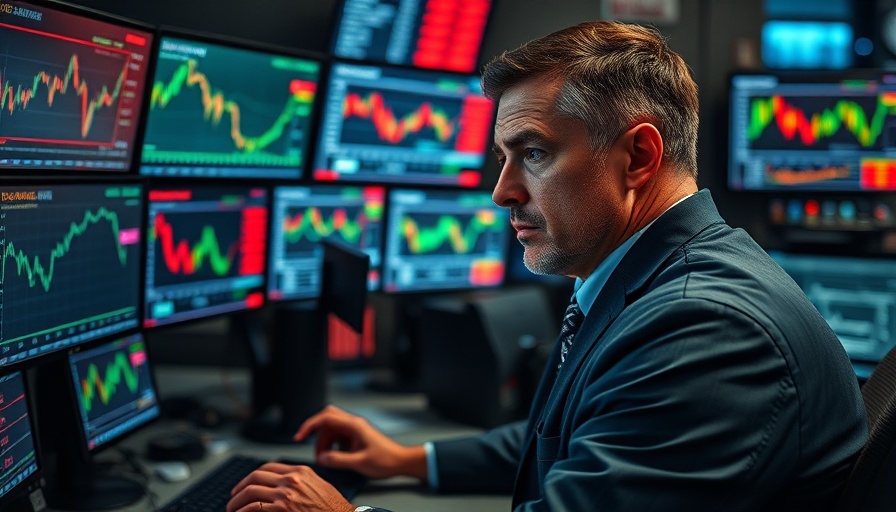
Stock Market Reaction to Tariff Announcements: What Just Happened?
On April 7, 2025, the U.S. stock market demonstrated significant volatility as investors grappled with dual pressures: the implementation of a 10% tariff on imports declared by President Donald Trump and the swirling rumors circulating on social media. Initially, the S&P 500 index recorded notable losses, weakening enough to threaten bear market territory—defined as a 20% fall from recent peaks. However, social media speculation about a potential 90-day delay on tariffs brought a brief rally before the White House promptly dismissed the claim, leading stocks to tumble back into the red.
This episode starkly illustrates how social media now plays a prominent role in financial markets. The fluctuations triggered by mere speculation are a testament to how investor sentiment and anxiety interact in today's fast-paced trading environment. As Bloomberg noted, this swift denial of a possible tariff pause highlights the administration's unwavering stance for now, as market participants continue to hope for signs that Trump may reconsider his trade policies.
The 'Five-Alarm Fire' That Echoes Past Crises
The reactions from business leaders were no less stark. With comparisons drawn to the catastrophic 2007-2008 financial crisis, senior executives expressed urgent calls for action to stabilize the situation. A notable figure, hedge fund manager Bill Ackman, advocated for a “90-day time out” on tariffs, reflecting a growing anxiety that the aftermath of these policies may lead to significant economic repercussions.
Many financial analysts echo this sentiment of concern regarding the uncertainties that have become commonplace since the tariff announcements, signaling a need for clearer guidance from the administration to prevent further market turmoil. While the Federal Reserve has traditionally played a stabilizing role in times of economic strife, Chair Jerome Powell indicated the need for a cautious approach in this instance, stating that tariffs have consequences that require time for assessment.
Social Media: The Unseen Influence Over Financial Markets
This scenario raises essential questions about the relationship between social media and financial stability. Rumors took flight across various platforms, amplifying investor emotions and reactions that led to a day of erratic trading. In this digitally connected age, even a brief mention or tweet can sway the market's direction, showcasing how modern news cycles can rapidly impact investment strategies. Social media's power to influence perceptions — whether informed or speculative — cannot be overstated as we navigate an ever-evolving marketplace.
The Economic Landscape: Looking Forward
As the U.S. grapples with tariff implementations, companies and investors alike are keenly watching the unfolding reality of trade relationships, notably with China. The ramifications of the tariffs could reverberate through various sectors, affecting not only American companies but also global markets. Understanding these potential impacts is essential for both individuals and businesses to navigate future uncertainties.
With these unfolding events, we stand at a critical juncture; the evolving economic landscape invites stakeholders to remain engaged and informed. The 2025 economic scenario will demand timely updates to stay ahead of developments in trade policy and market reactions.
Decisions to Engage With Current Events
The landscape is fraught with challenges and the critical question arises: What strategies can individuals employ in uncertain economic times? For business leaders, having contingency plans and diversifying investments may cushion adverse effects from unexpected market swings. Individuals holding investments need to stay tuned to economic indicators and trade talks to align their strategies accordingly.
Moreover, working with knowledgeable advisors or attorneys to navigate economic resilience becomes increasingly valuable as tariffs continue to shape global operations. Keeping one pulse on breaking news today and latest headlines about trade policies will empower consumers and investors alike.
Conclusion: Engage with the Future of Economic Policy
This ongoing saga of tariffs and trade provides a compelling case for why it’s essential to engage actively with economic news. With uncertainties looming and market volatility persisting, understanding the complexity of trade relationships and political decisions is vital for proactive decision-making. As these discussions evolve, collaboration among business leaders, investors, and policymakers will be paramount.
Stay informed and take control of your economic destiny. Make sure to follow the evolving situation as it could signal changes impacting your investments and financial future.
 Add Row
Add Row  Add
Add 




 Add Row
Add Row  Add
Add 

Write A Comment